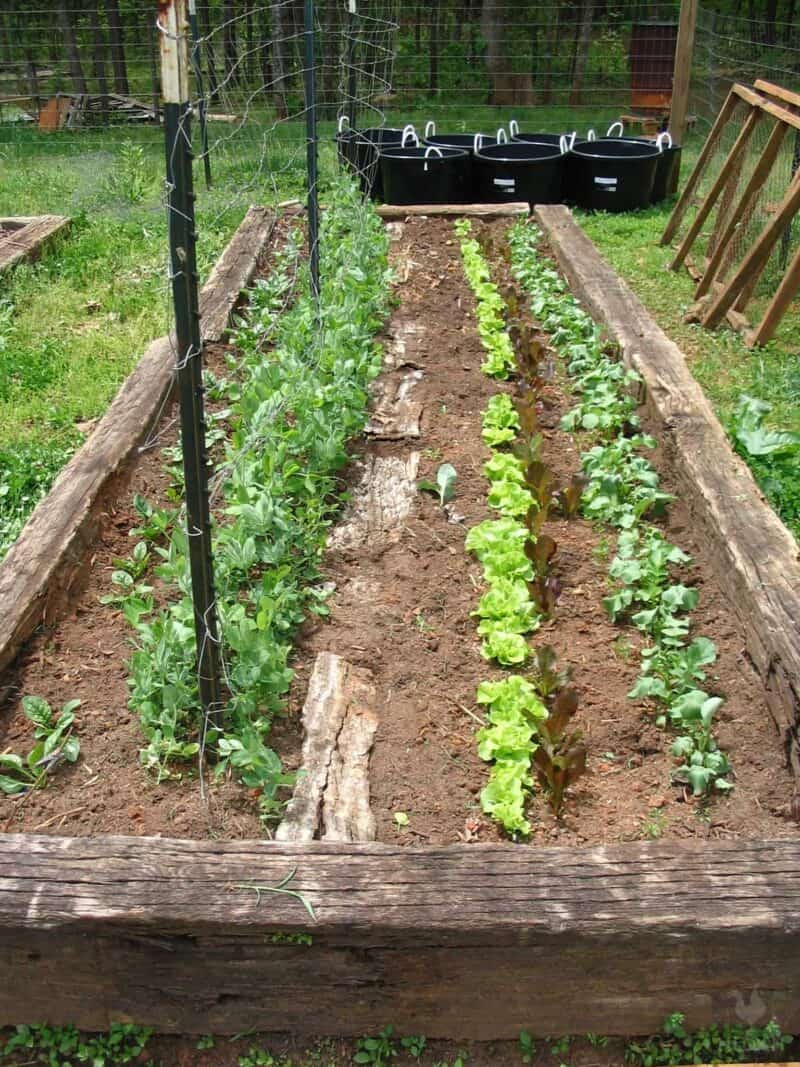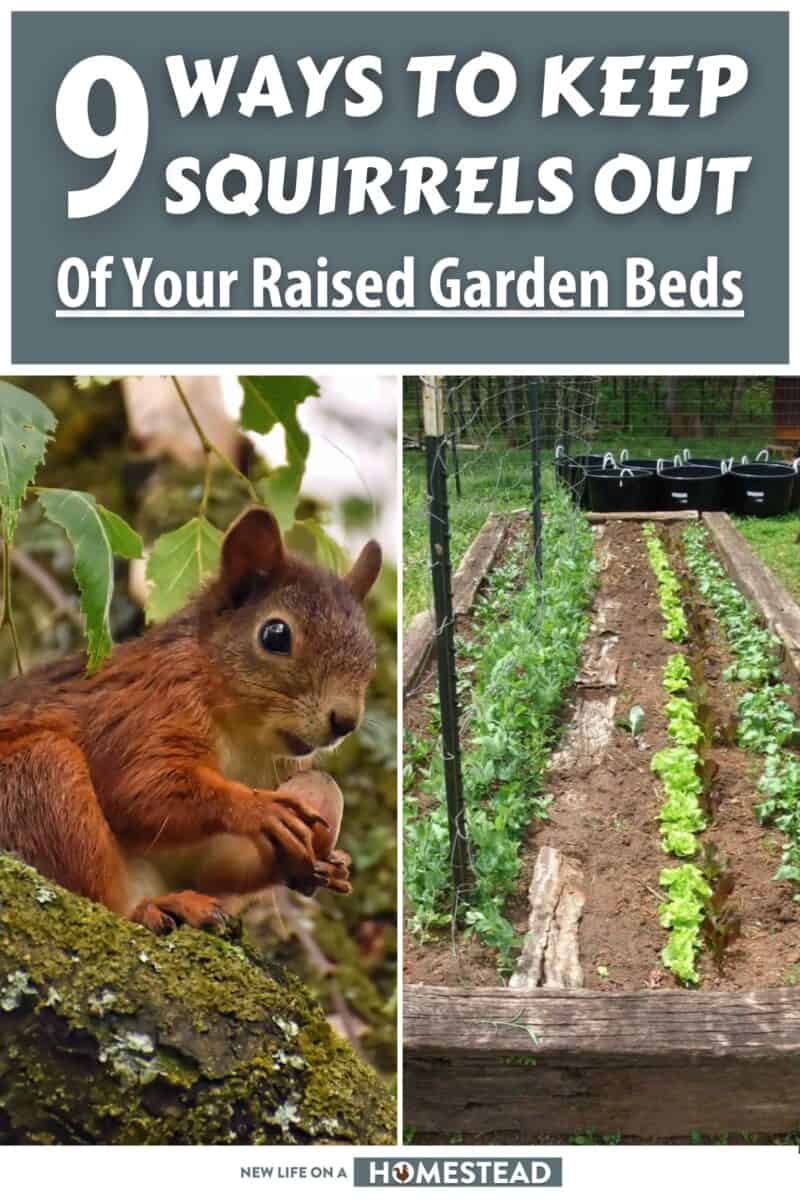It has been said that squirrels are merely rats with good publicity, and I for one believe this assertion.

I don’t hate them or anything, and they certainly are cute, but when it comes to sheer destructive capability squirrels are right up there with their uglier cousins but they get a pass because of those good looks!
If you have a garden or tend to any plants outside, you already know: they massacre bulbs, tender shoots and more, and seemingly no matter what you do these nimble, crafty rodents always find a way to get after your plants.
But, you don’t need to despair and you don’t need to tear your hair out: it is possible to keep squirrels out of your garden beds with a combination of ingenuity and some choice of equipment.
I’ll be sharing with you nine proven methods to do just that today…
1. Use Repellent Plants Against Them
One of the best and least harmful tactics for keeping squirrels out of your garden beds is just to employ offensive scents that they hate.
Squirrels are like all rodents in that they have a profoundly powerful sense of smell. This helps them find food, naturally, but also means they are susceptible to odors they find offensive or harmful.
It is well known that squirrels hate both garlic and onions, but even some flowers like lilies, daffodils and goldenrod seem to drive them away.
You can also try to repel squirrels with Irish Spring Soap or Epsom salt, as they are well-known repellents of many mammals even though they don’t smell offensive to people.
You might have to try a few different options until you land on one that will reliably keep squirrels away, or might even be a combination of fragrances, but with a little experimentation you can at least repel some squirrels some of the time.
2. Employ Mesh Bed Covers
Sometimes, the most direct method for protection of your assets is also the best. Covering up your raised beds and the vulnerable plants they contain with some sort of mesh cover will act as a physical barrier to keep squirrels out.
Considering how persistent, clever and agile squirrels are, this might be the ideal solution for you…
It’s a good solution, and one that you can purchase over the counter or make yourself if you are crafty, but it isn’t perfect.
Squirrels can easily chew through softer materials, so you’ll probably want to use chicken wire or something similar for the purpose.
Also, you must make sure the cover fits down snugly on the beds in an effort to keep squirrels from burrowing beneath it.
Squirrels aren’t major diggers like groundhogs are, but they are surprisingly adept at it and they can wriggle through any opening where their head can fit.
It doesn’t take much work for them to dig a little ditch where they can then pop under your cover and sit inside munching on your flowers and vegetables.
3. Spray Commercial Repellent
There are several commercial squirrel repellents on the market, and some folks swear by them.
These scientifically formulated chemicals are nominally safe for squirrels, people and other animals, and might work off a principle of nauseating odor, irritant or both.
If you don’t mind spending a little money on the problem and keeping up with reapplication at prescribed intervals or after a hard rain this could be a good option to try.
Just make sure you follow the manufacturer’s instructions for mixing, if applicable, and for application.
4. Keep Your Garden Bed Areas Tidy
A good plan that is not entirely obvious. Squirrels are attracted to overgrown, cluttered areas where they can exploit their maneuverability advantage to good effect and also enjoy cover from predators that might see them and make a pass at them.
Squirrels that are forced to be in the open, especially on the ground, tended to be more nervous and less bold in their comings and goings.
That being said, many squirrels are firmly considered to be urbanized animals, and are a lot more comfortable in cleared spaces like those surrounding human habitation.
That being said, keeping your grounds and garden bed areas tidy is always good practice, and combining this with other methods on this list might add up to effective squirrel defense.
If nothing else, it will help you see when squirrels are attacking your plants!
5. Try Predator Decoys
Squirrels are common prey for all sorts of predators, particularly birds of prey, foxes, coyotes, cats, and more.
It naturally follows that they are highly anxious concerning the presence or potential presence of any predator, and it doesn’t take much to convince a squirrel that it is better to live and nibble another day than to hang around.
We can exploit this natural instinct of self-defense by placing predator decoys around our beds.
Owls and other birds of prey and even rubber snakes can all frighten squirrels into believing that their lives are in danger and they should head the other way.
It is definitely an effective technique, and one that has been used for ages. Unfortunately, it requires lots of babysitting since you’ll need to move the decoys around for squirrels to believe the ruse.
And, not for nothing, squirrels are extremely clever and many will just catch on that they aren’t dealing with a real predator and ignore the decoy.
Worth a try, but have a backup plan.
6. Try Predators Scents, Too
A more effective method of exploiting a squirrel’s fear of predators and one that also uses their excellent nose against them.
You can try obtaining predator urine or other secretions from animals like bobcats, coyotes, and so forth and then spraying it around your garden beds to see if it will repel the squirrels.
The legitimate odor of a predator is a lot more convincing than a plastic or foam decoy!
This works especially well in conjunction with other methods but it does have one major drawback, namely the fact that you’ll be smelling this awful stuff, too.
7. Get a Dog or Cat
Sometimes a real predator of squirrels is what you need! If you have a dog or a cat that you let roam outside, you can depend on them keeping the squirrels way up in the trees where they belong.
We all know there is hardly anything that a dog loves more than chasing squirrels, and cats are genuinely truly able predators as far as they are concerned.
But that might be a drawback, too. Dogs are notorious for digging up and trampling plants if they aren’t fenced off, and domestic cats are actually apex predators responsible for severe ecological damage.
They kill off birds, reptiles, small mammals and other creatures relentlessly, and you really shouldn’t let your cat roam free outside without good cause.
Whether or not this is a cause worthy of letting your animals patrol your garden beds is for you to decide.
8. Soak Them With a Hose or Sprinkler
Sometimes giving a squirrel to startle of its life is enough to shock it into changing its behavior and habits.
A blast of water from a hose or sprinkler might do the trick. It might not, but it’s worth a try, and is generally harmless to the squirrel and the environment.
To pull this off, either hang out nearby with your water hose on and be ready to take shots at squirrels that come too close to the garden beds.
Alternately, you can set up a sprinkler and be ready to turn it on remotely whenever you see the squirrels closing in.
The most advanced and also one of the coolest ways to implement this technique is with an automated robot sentry sprinkler, a product designed to turn on and spray whenever it detects heat or motion nearby.
I’m not kidding, these are actual products you can get today!
What’s important is that you actually give the squirrel a good blast, so the impact and the sudden soaking shocks it: a gentle, pleasant missed from a common sprinkler is probably going to be an incentive more than a deterrent.
9. Scatter Cayenne Pepper Powder
If you don’t mind giving the squirrel a little bit of pain as incentive to keep away from your garden beds, you can rely on a time-tested trick that your great-grandfather probably used: cayenne pepper powder.
This stuff basically works like pepper spray for animals, and though it hurts, it won’t truly hurt them if that makes sense.
Hot peppers are hot because they contain a compound called capsaicin, and the plant uses this as a defense mechanism to keep mammals from eating it.
By sprinkling plenty of cayenne pepper on and around your raised beds you can be sure that squirrels will inhale a little bit of it when they come close and disturb it.
This will irritate the living daylights out of them and they will certainly retreat.
The downside is that you’ll have to reapply it constantly as it blows away or gets washed away by rain, but it is so cheap and environmentally friendly I think it is worth the minor inconvenience.

Tom has lived and worked on farms and homesteads from the Carolinas to Kentucky and beyond. He is passionate about helping people prepare for tough times by embracing lifestyles of self-sufficiency.
